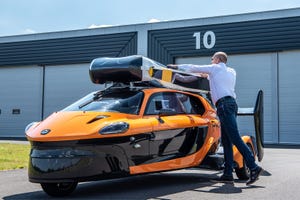Apple Kills Self-Driving Car Project
It’s the end of the road for Apple’s decade-long autonomous car project

Apple has finally called time on its effort to build a self-driving electric car.
The secretive long-running program, known internally as Project Titan, had been running for a decade, having first been established in 2014.
But earlier this week, staff working on the project were informed that it was being shut down, with no sign of any production autonomous vehicle (AV) imminent.
The news was delivered by Apple chief operating officer Jeff Williams and project leader Kevin Lynch, according to Bloomberg, which broke the story.
Apple has not commented publicly on the development, which is in keeping with its silence on Project Titan over the past 10 years.
It is understood that around 14,00 staff were working on the AV, some of whom will be redeployed in other roles within the company – including in AI – while others will be let go.
At its height, it is believed that up to 5,000 workers were focused on the Project Titan effort.
The self-driving car was originally envisaged as a way for Apple to diversify beyond its traditional markets of smartphones and computer hardware.
Initially, the prospect of the company disrupting the global automotive industry was eagerly anticipated by many, given the company’s success with other groundbreaking products.
However, despite a succession of executives from legacy car makers being brought on board to assist Apple in its efforts, the slow rate of progress became increasingly evident.
There were also constant rumors about the changing focus of what Apple was actually trying to deliver, partially caused by the company’s unwillingness to say anything at all about the program.
At first, it was believed Apple intended to deliver a true AV, with no steering wheel or pedals.
Then it appeared that the company would concentrate instead on AV software, before changing course again and refocusing on producing the vehicle itself.
But even the nature of what that would have resembled was shrouded in mystery, with various reports at various times pitching it as anything from a rival to a more conventional production car, like a Tesla, to a more bespoke, fully autonomous machine.
Recent speculation suggested that the vehicle’s release would not come until 2028 and that it was more likely to feature Level 2+ driver assistance technology than full autonomy.
Whatever the truth of what was being worked on, it appears that as others have found out, the time, expense and complexity of developing an advanced electric vehicle with self-driving capability had been underestimated.
And it seems that Apple has concluded that despite having already spent billions of dollars on the project, it was wiser to pull the plug now rather than invest hundreds of millions more with no guarantee that a vehicle would deliver healthy profit margins, or even see the light of day.
The development follows Ford’s decision to refocus its AV ambitions in 2022 when it dramatically pulled its backing from Argo AI, and a stalling in demand for EVs generally, with Tesla recently warning of slow sales growth in 2024.
About the Author
You May Also Like








